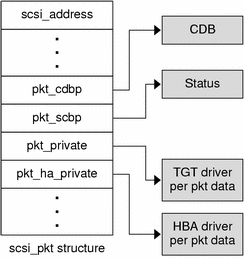Table 15-3 lists the SCSA HBA entry points arranged by function groups.
Table 15-3 SCSA Entry Points
Function Groups | Entry Points Within Group | Description |
|---|---|---|
Target Driver Instance Initialization | tran_tgt_init(9E) | Performs per-target initialization (optional) |
| tran_tgt_probe(9E) | Probes SCSI bus for existence of a target (optional) |
| tran_tgt_free(9E) | Performs per-target deallocation (optional) |
Resource Allocation | tran_init_pkt(9E) | Allocates SCSI packet and DMA resources |
| tran_destroy_pkt(9E) | Frees SCSI packet and DMA resources |
| tran_sync_pkt(9E) | Synchronizes memory before and after DMA |
| tran_dmafree(9E) | Frees DMA resources |
Command Transport | tran_start(9E) | Transports a SCSI command |
Capability Management | tran_getcap(9E) | Inquires about a capability's value |
| tran_setcap(9E) | Sets a capability's value |
Abort and Reset | tran_abort(9E) | Aborts one or all outstanding SCSI commands |
| tran_reset(9E) | Resets a target device or the SCSI bus |
| tran_bus_reset(9E) | Resets the SCSI bus |
| tran_reset_notify(9E) | Request to notify target of bus reset (optional) |
Dynamic Reconfiguration | tran_quiesce(9E) | Stops activity on the bus |
| tran_unquiesce(9E) | Resume activity on the bus |
Target Driver Instance Initialization
The following sections explain target entry points.
tran_tgt_init() Entry Point
The tran_tgt_init(9E) entry point enables the HBA to allocate and/or initialize any per-target resources. It also enables the HBA to qualify the device's address as valid and supportable for that particular HBA. By returning DDI_FAILURE, the instance of the target driver for that device will not be probed or attached.
This entry point is not required, and if none is supplied, the framework will attempt to probe and attach all possible instances of the appropriate target drivers.
static int
isp_tran_tgt_init(
dev_info_t *hba_dip,
dev_info_t *tgt_dip,
scsi_hba_tran_t *tran,
struct scsi_device *sd)
{
return ((sd->sd_address.a_target < N_ISP_TARGETS_WIDE &&
sd->sd_address.a_lun < 8) ? DDI_SUCCESS : DDI_FAILURE);
}
|
tran_tgt_probe() Entry Point
The tran_tgt_probe(9E) entry point enables the HBA to customize the operation of scsi_probe(9F), if necessary. This entry point is called only when the target driver calls scsi_probe(9F).
The HBA driver can retain the normal operation of scsi_probe(9F) by calling scsi_hba_probe(9F) and returning its return value.
This entry point is not required, and if not needed, the HBA driver should set the tran_tgt_probe vector in the scsi_hba_tran(9S) structure to point to scsi_hba_probe(9F).
scsi_probe(9F) allocates a scsi_inquiry(9S) structure and sets the sd_inq field of the scsi_device(9S) structure to point to the data in scsi_inquiry(9S). scsi_hba_probe(9F) handles this automatically. scsi_unprobe(9F) then frees the scsi_inquiry(9S) data.
Other than during the allocation of scsi_inquiry(9S) data, normally handled by scsi_hba_probe(9F), tran_tgt_probe(9E) must be stateless, as the same SCSI device might call it multiple times.
Note - The allocation of the scsi_inquiry(9S) structure is handled automatically by scsi_hba_probe(9F). This is only of concern if you want custom scsi_probe(9F) handling.
static int
isp_tran_tgt_probe(
struct scsi_device *sd,
int (*callback)())
{
Perform any special probe customization needed.
/*
* Normal probe handling
*/
return (scsi_hba_probe(sd, callback));
}
|
tran_tgt_free() Entry Point
The tran_tgt_free(9E) entry point enables the HBA to perform any deallocation or clean-up procedures for an instance of a target. This entry point is optional.
static void
isp_tran_tgt_free(
dev_info_t *hba_dip,
dev_info_t *tgt_dip,
scsi_hba_tran_t *hba_tran,
struct scsi_device *sd)
{
Undo any special per-target initialization done
earlier in tran_tgt_init(9F) and tran_tgt_probe(9F)
}
|
Resource Allocation
The following sections discuss resource allocation.
tran_tgt_pkt() Entry Point
The tran_init_pkt(9E) entry point is the HBA driver function that allocates and initializes, on behalf of the target driver, a scsi_pkt(9S) structure and DMA resources for a target driver request.
The tran_init_pkt(9E) entry point is called when the target driver calls the SCSA function scsi_init_pkt(9F).
Each call of the tran_init_pkt(9E) entry point is a request to perform one or more of three possible services:
Allocation and initialization of a scsi_pkt(9S) structure
Allocation of DMA resources for data transfer
Reallocation of DMA resources for the next portion of the data transfer
Allocation and Initialization of a scsi_pkt(9S) Structure
The tran_init_pkt(9E) entry point must allocate a scsi_pkt(9S) structure if pkt is NULL through scsi_hba_pkt_alloc(9F).
scsi_hba_pkt_alloc(9F) allocates the following:
scsi_pkt(9S)
SCSI CDB of length cmdlen
SCSI status completion area of length statuslen
Per-packet target driver private data area of length tgtlen
Per-packet HBA driver private data area of length hbalen
The scsi_pkt(9S) structure members, as well as pkt itself, must be initialized to zero except for the following members: pkt_scbp (status completion), pkt_cdbp (CDB), pkt_ha_private (HBA driver private data), pkt_private (target driver private data). These members are pointers to memory space where the values of the fields are stored, as illustrated in Figure 15-5. For more information, refer to "scsi_pkt Structure".
Figure 15-5 scsi_pkt(9S) Structure Pointers

Example 15-2 provides an example of allocation and initialization of a scsi_pkt(9S) structure.
Example 15-2 HBA Driver Initialization of a SCSI Packet Structure




